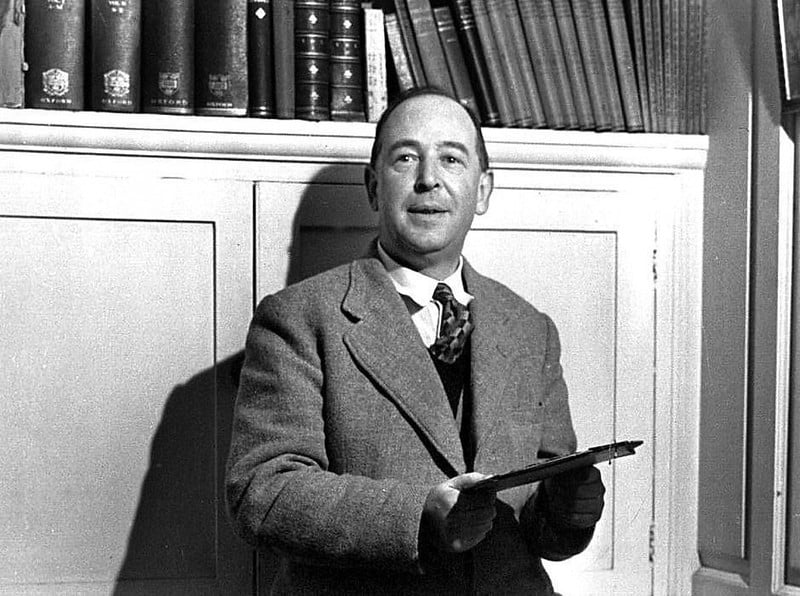
Simul, the online journal of St. Paul Lutheran Seminary, was putting together an issue on C. S. Lewis from a Lutheran perspective and asked me to contribute. So I took that as an opportunity to write about how Lewis–although no Lutheran–was, in fact, instrumental in my becoming one.
The issue is up now and you can read my article here. You may well be interested in the other articles on the subject as well. (When you go to the site, you will be asked to give your name and email address. That will give you free access. When I did that, the pages were overly large, but clicking “view” and then “actual size” on my browser solved the problem.)
Let me get you started by posting the opening and the first two sections here, hoping you will “keep reading” by clicking the link. I’ll also tell you a little about the rest of what I wrote.
Here is how the article begins. . . .
When I was a teenager, I was big fan of J. R. R. Tolkien’s Lord of the Rings. One of the blurbs on the back of my Ballantine edition of the trilogy expressed how the fantasy novels made me feel: “here are beauties that pierce like swords or burn like cold iron.” We lived in a small town in Oklahoma, but occasionally my parents would drive us all to Tulsa, the big city, and when we did, we would go to a bookstore. Randomly browsing the shelves on one visit, I saw a name that I recognized: C. S. Lewis. He was the one who wrote the line about beauties that pierce like swords and burn like cold iron!1 I opened the book and saw that it was dedicated to J. R. R. Tolkien! I had to buy that book, so, using the money I earned from my job at the Dairy Queen, I bought Screwtape Letters. After reading Lewis’s preface, I remember marveling, “He really believes in the devil!” I found the novel itself, with its combination of satirical humor and ironic spiritual counsel, entrancing. I was raised in a mainline liberal Protestant denomination and had never heard anything like this. “Here is someone,” I thought, “who takes all of that old stuff in Christianity seriously.”
Mere Christianity
I had to read more. I next bought Mere Christianity. This one blew me away. My church had no creeds and let us believe whatever we wanted, though I was aware of Jesus and the Bible. But Lewis was showing me actual theology. When I got to the part in the book about the Incarnation, I was thunderstruck. Jesus is God? God became a human being! I had never even heard that before. This struck me as beyond wonderful, giving me a completely different way of thinking about God— not as an abstraction looking down on us from up above, but as a real person who came down from heaven to become one of us.
I was so stimulated by what I was learning from Lewis about the Incarnation that I wanted to talk to one of our ministers about it. I shared my excitement with a youth minister, fresh out of seminary. “Well,” he told me, “we don’t really stress that anymore.”
Deflated, I began to look elsewhere. Lewis said that he was simply writing about “mere Christianity,” the beliefs common to all Christians from all denominations. But I found mere Christianity hard to find. I saw traces in my Baptist friends, but they didn’t have much theology. I could see some of it in the Catholic church, but it was the 1960s and the services I visited and the priests I talked to were caught up in post-Vatican II modernism.
How the Anglican Lewis Led Me to Luther
I kept reading Lewis and then the books that he read that were instrumental in his coming to faith. I learned more and more, but books alone are no substitute for a church.
I went off to college, got married, went to grad school. Having exhausted my C. S. Lewis-inspired reading list, I finally read the Bible, which had a big impact. We started hanging out with campus evangelicals, though we still attended that same mainline Protestant church.
I wrote my dissertation about the 17th century Christian poet George Herbert, focusing on how he was influenced by the Reformation. This had me reading the Anglican Reformers, Puritans, Calvin, and my personal favorite Luther.
My first academic job took us back to small town Oklahoma. My wife and I resolved to find a church that believed in the Bible and in the Gospel, so we started church-shopping. We visited a Lutheran congregation, where we were overwhelmed with the liturgy—“It’s like stepping back into the Middle Ages,” my wife said, which for us was a good thing—and I was amazed to see that the church still taught what I had been studying in my dissertation. We took the adult instruction class and became Lutherans. Since then, I have been going deeper and deeper into the Lutheran tradition, which I have found unutterably satisfying. Though many factors and life experiences brought us to Lutheranism, I credit C. S. Lewis with starting me on my way. Lewis was not a Lutheran. Anglicans, even conservative ones like Lewis, are characterized by doctrinal latitude, their main point of unity being liturgical worship according to the Book of Common Prayer. I can now see clearly where Lewis falls short according to Lutheran confessional standards. And yet, Lewis is often helpful to a Lutheran perspective anyway.
[Keep reading. . .]
I go on to explain what I mean by that. Lewis was weak on the Atonement, but his description in The Lion, the Witch, & the Wardrobe of Aslan dying for Edmund, offering himself to the White Witch as a substitute for a rotten little sinner, made me realize the significance of the Substitutionary Atonement.
Lewis didn’t believe in the Inerrancy of Scripture, yet his essay “Fern Seeds and Elephants” liberated me from the anti-supernatural Historical Critical approach to the Bible that was all I knew from the Bible scholars in my liberal denomination.
I go into other of his faults, such as his belief in an idiosyncratic, non-historical belief in Purgatory, but also how he supported a number of Lutheran teachings, such as the distinction between Law and Gospel, worship as receiving God’s gifts, the doctrine of vocation, and a high view of baptism and the Lord’s Supper.
I also get into what Lewis, as a scholar specializing in 16th century literature, had to say about Luther. It was always positive. And Lewis clearly understood and appreciated Luther’s message: the joy and freedom of the Gospel.
I found in Lutheranism the “mere Christianity” that Lewis introduced me to. Not as an ecumenical lowest common denominator but as a theological tradition that, as I say in my conclusion, offers “a theology that embraces the whole scope and range of Christianity, being sacramental and liturgical like the Catholics, while also being Biblical and evangelical like the Protestants. Only a rigorous theology can hold such poles together.”
Photo: C. S. Lewis by Levan Ramishvili via Flickr, Public Domain



















